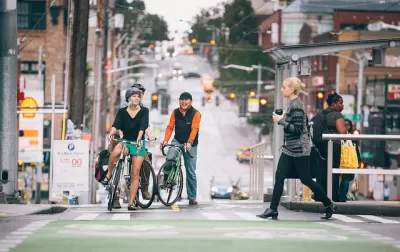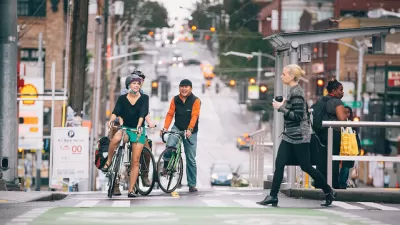The data on bike helmets have changed. Laws are starting to change too.

The Board of Health in King County, Washington voted last week "to repeal its decades-old mandatory helmet law for bicycle riders," reports David Kroman for the Seattle Times. The decision to rescind the 1993 law came after data revealed that the law was enforced selectively, disproportionately targeting people of color and people experiencing homelessness.
As explained by Kroman, in 1993, evidence suggested that mandatory helmet laws would increase helmet use and reduce the severity of injuries. Kroman provides this summary of more recent research:
But recent data connecting helmet laws to their use and improved outcomes for cyclists is less clear. In Seattle, helmet use among riders of private bikes is as high as 91%, according to one study. Meanwhile, in Portland, which does not have an all-ages helmet law, one study found use is similarly high. A study in King County could not find any discernible impact on hospitalization rates following the law’s expansion into Seattle in 2003, although severity of injuries did decrease around the same time.
A separate article by Bicycle Retailer digs into the research behind the decision, including a study by Ethan Campbell, a PhD candidate at the University of Washington. A December 2020 article by Kroman, writing for Crosscut at the time, revealed data about the use of mandatory helmet laws to cite people experiencing homelessness.
The decision to drop the county's mandatory helmet laws to disparate impacts also made the New York Times, in an article by Sophie Kasakove.
FULL STORY: King County repeals mandatory bicycle helmet law

Maui's Vacation Rental Debate Turns Ugly
Verbal attacks, misinformation campaigns and fistfights plague a high-stakes debate to convert thousands of vacation rentals into long-term housing.

Planetizen Federal Action Tracker
A weekly monitor of how Trump’s orders and actions are impacting planners and planning in America.

San Francisco Suspends Traffic Calming Amidst Record Deaths
Citing “a challenging fiscal landscape,” the city will cease the program on the heels of 42 traffic deaths, including 24 pedestrians.

Defunct Pittsburgh Power Plant to Become Residential Tower
A decommissioned steam heat plant will be redeveloped into almost 100 affordable housing units.

Trump Prompts Restructuring of Transportation Research Board in “Unprecedented Overreach”
The TRB has eliminated more than half of its committees including those focused on climate, equity, and cities.

Amtrak Rolls Out New Orleans to Alabama “Mardi Gras” Train
The new service will operate morning and evening departures between Mobile and New Orleans.
Urban Design for Planners 1: Software Tools
This six-course series explores essential urban design concepts using open source software and equips planners with the tools they need to participate fully in the urban design process.
Planning for Universal Design
Learn the tools for implementing Universal Design in planning regulations.
Heyer Gruel & Associates PA
JM Goldson LLC
Custer County Colorado
City of Camden Redevelopment Agency
City of Astoria
Transportation Research & Education Center (TREC) at Portland State University
Jefferson Parish Government
Camden Redevelopment Agency
City of Claremont





























